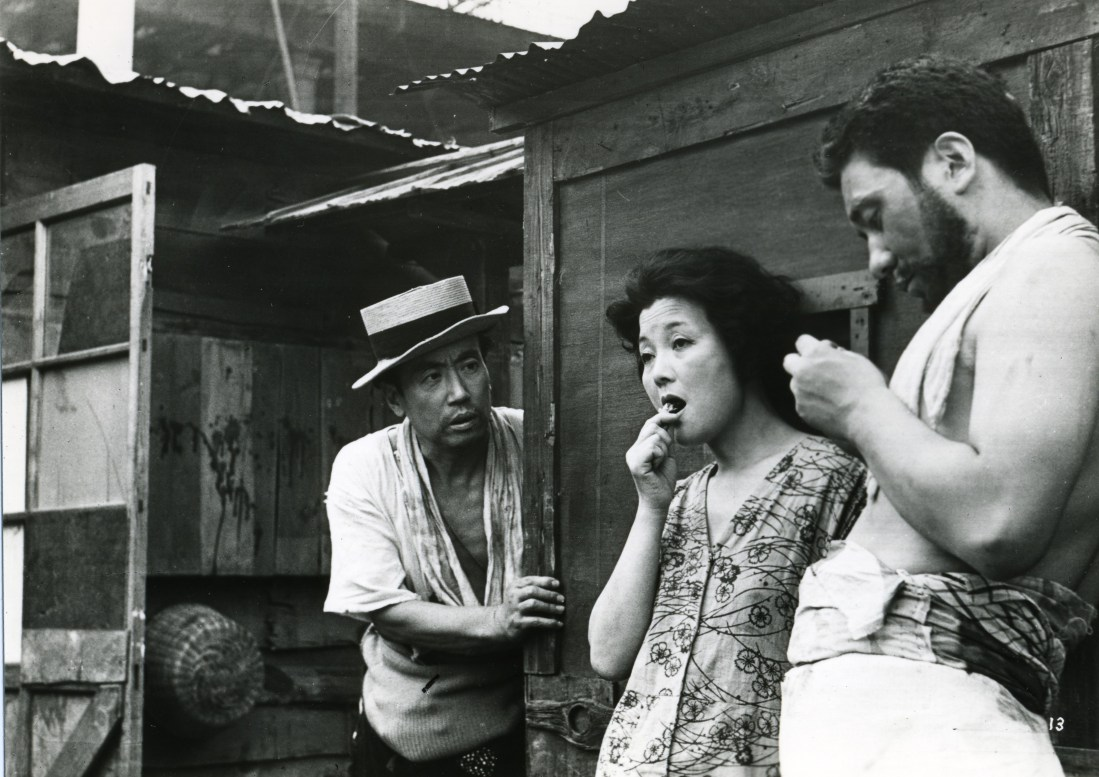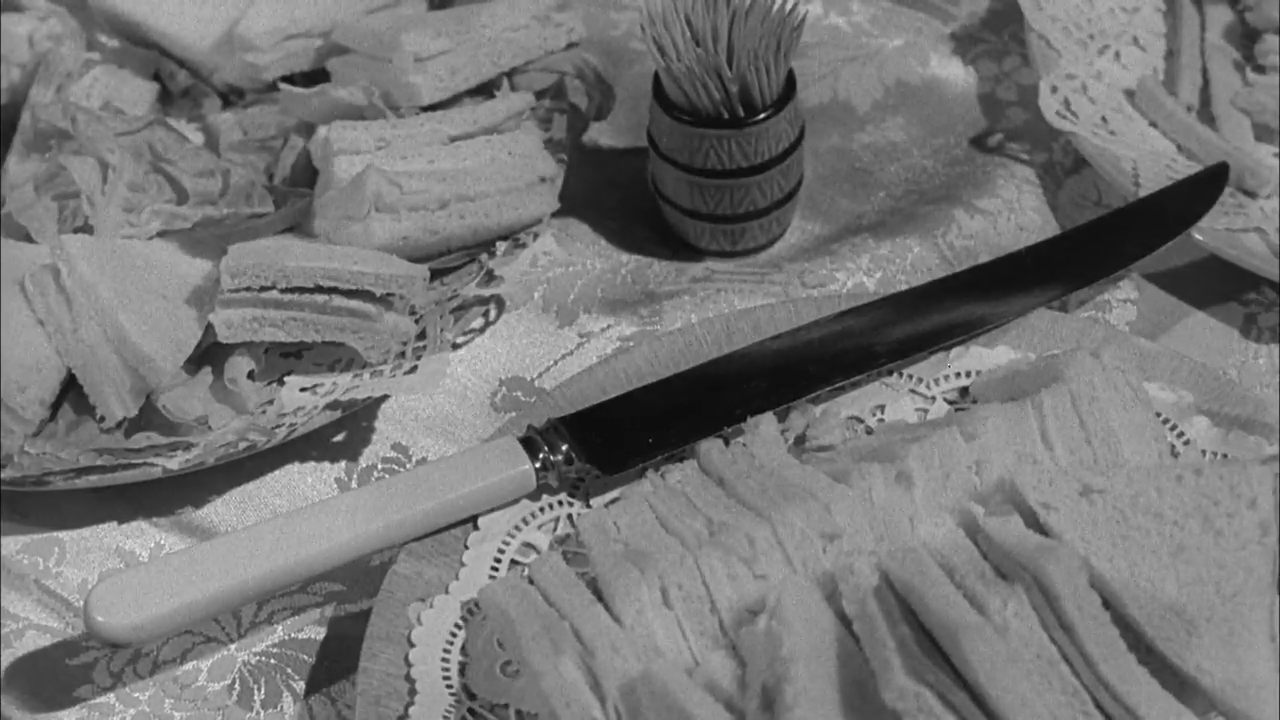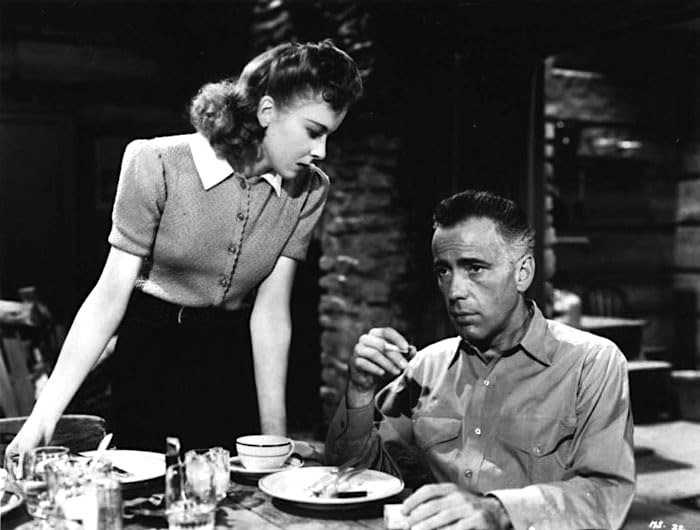“Empires, the past – they're beyond me! Will things change for the better? Will bums like these disappear? And the slums too? Come on. Tell us!”太陽の墓場 [Taiyō no hakaba / Grave of the Sun / The Sun's Burial] (Nagisa Ōshima, 1960)
Mar
31

An empty-looking woman eats something while a scrawny man in a pork pie hat and dirty shirt eyes her. Next to the woman a bulking bearded guy, cleaning his nails. DP: Takashi Kawamata.
– Hanako
crime
Max et les ferrailleurs [Max and the Junkmen] (Claude Sautet, 1971)
Mar
16

Lily (Schneider) and Max (Piccoli) at a small table decked with good food, good wine, and quite a few wads of cash. DP: René Mathelin.
Devil Doll (Lindsay Shonteff, 1964)
Mar
15
sandwiches

A large knife amongst rather minuscule triangular tea sandwiches. A miniature wooden barrel holding toothpicks is right there for your sandwich stabbing convenience. DP: Gerald Gibbs.
“Can we not admit that certain skilled men, gifted with intelligence, talent or even genius, and thus indispensable to society, rather than stagnate, should be free to disobey laws in certain cases?”Pickpocket (Robert Bresson, 1959)
Mar
12

Michel (Martin LaSalle) in a busy café, observing. An emptied water glass next to the thief should make him look like a paying guest. DP: Léonce-Henri Burel.
– Michel
Mord und Totschlag [Degree of Murder] (Volker Schlöndorff, 1967)
Mar
4
juice

A pensive Marie (Anita Pallenberg) drinking something red from a bottle with a green straw. DP: Franz Rath..
“Another day, another ball of fire rising in the summer sky. The city is quiet now, but it will soon be pounding with activity. This time yesterday, Jean Dexter was just another pretty girl, but now she's the marmalade on 10,000 pieces of toast.”The Naked City (Jules Dassin, 1948)
Feb
10
Popsicles

A New York precinct. Across the street an ice cream vendor. Several kids are standing around the man's cart while one of them – a chunky monkey – leans against the nearest fire hydrant. A scruffy man in fedora walks past holding a Popsicle. DP: William H. Daniels; still photographers: Bert Anderson & Arthur “Weegee” Fellig.
– narrator
“You know, it isn't what a man wants to do, Lacey, but what he has to do. Now take me – I love to smoke cigarettes, but the doctors say I can't have them. So what do I do? I chew toothpicks, tons of them.”Crime Wave [The City Is Dark] (André De Toth, 1953)
Jan
29
dinner for two

Ellen Lacey (Phyllis Kirk) serving a bunch of punks (Bronson (2nd from the left, and Ted de Corsia (right) the food she prepared for herself and her husband Steve (Gene Nelson). DP: Bert Glennon.
– Det. Lt. Sims
Mikey and Nicky (Elaine May, 1976)
Jan
27
milk and cigarettes

The titular Mikey and Nicky sharing snacks, smokes, and sips at a tiny fast food table. There are piles of boxes with canned beer behind them. Mikey (Falk) cheesily grins at Nicky (Cassavetes). DPs: Bernie Abramson, Lucien Ballard, Jack Cooperman, Jerry File & Victor J. Kemper.
– Do you play?
– Try me.The Thomas Crown Affair (Norman Jewison, 1968)
Jan
26
champagne

A production photo showing Thomas Crown (McQueen) and Vicki Anderson (Dunaway) sharing foods and drinks. Them seem enthralled with each other. DP: Haskell Wexler.
“Roy, this is the land of milk and honey for the health racket. Every woman in California thinks she's either too fat or too thin or too something.”High Sierra (Raoul Walsh, 1940)
Jan
19

Roy Earle (Bogart) pensively smoking an after-meal cigarette while Marie Garson (Lupino) looks on. DP: Tony Gaudio.
– 'Doc' Banton